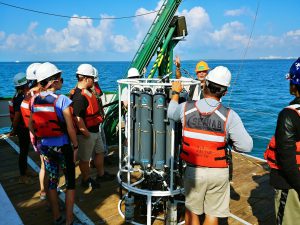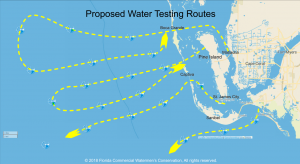A relatively small, one-time NCCOS funding contribution to aid the study of red tide off southwest Florida has helped produce an unexpected long-term benefit – the establishment of a citizen science initiative to monitor for red tide and a previously unknown low dissolved oxygen “dead zone” off the southwest coast of Florida.

NCCOS Event Response funding, in tandem with additional funding from NOAA’s Southeast Fisheries Science Center (SEFSC), helped support an October 2018 research cruise aboard the R/V F.G. Walton Smith, led by Dr. Christopher Kelble of NOAA’s Atlantic Oceanographic and Meteorological Laboratory (AOML). NCCOS and SEFSC contributions helped to extend the cruise by 3 days, and allowed local fisherman, Casey Streeter, to participate in the cruise. The main focus of the cruise was to quantify human health and ecosystem impacts of the 2017-2018 massive red tide event. Streeter also directed scientists to areas of concern for local fisherman, which resulted in the discovery of a previously undiscovered southwest Florida dead zone.
NOAA/SEFSC stakeholder workshops focusing on the southwest Florida coast identified serious citizen concerns regarding red tide impacts on fish populations and habitat. Red tide was impacting not only the fish populations that commercial and for-hire fishing businesses depend upon, but other aspects of fishing communities such as aquaculture, recreational fishing, tourism, local seafood markets, and real estate values. The newly discovered dead zone heightened citizen concerns.
A celebrated outcome of the research cruise (funded in part by NCCOS and SEFSC) was the establishment of a NOAA-supported citizen science initiative to help NOAA and its Florida partners monitor water quality off the southwest Florida shelf. The Florida Commercial Watermen’s Conservation (aka Florida Watermen), a group of commercial fishermen, are now contributing their own water quality testing to help NOAA and the broader scientific community gain a better understanding of water quality issues and red tide events. AOML receives and quality controls the data from the Florida Watermen, before submitting it to the Gulf of Mexico Coastal Ocean Observing System (GCOOS).

In addition to water testing kits, the Florida Watermen were also equipped with a new “HABscope”, an instrument provided by NOAA and GCOOS that combines smartphone technology with a microscope, to help monitor the abundance of red tide species. By using the HABscope and sampling offshore, commercial fisherman can identify and provide an early warning to beachgoers of possible respiratory irritation risks from an approaching red tide bloom before it reaches shore.
NCCOS is pleased to have contributed to the success of this new government/citizen science success story. Through the NCCOS Harmful Algal Bloom Event Response Program, NCCOS is providing local organizations with modest financial support to defray event response costs, such as mobilization of sampling, supplies, and analytical services.
Read more about the NCCOS HAB Event Response for Florida red tide here.
For more information about NCCOS Event Response program, contact Dr. Mary Kate Rogener or Dr. Maggie Broadwater.
For more information about HABscope, contact Dr. Rick Stumpf.
